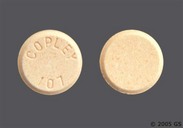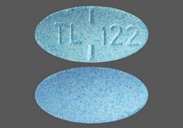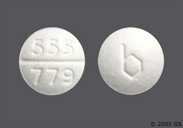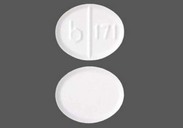M
Drug Class:
Antibacterial, topical; antifungal, topical
Mechanism of Action
Therapeutic Effect: Bacteriostatic. Promotes spontaneous healing of deep partial-thickness burns.
Precautions and Contraindications
Hypersensitivity to mafenide or sulfite or any other component of the formulation
Drug Class:
Antacid/aluminum/magnesium hydroxide
Mechanism of Action
An antacid that causes fewer hydrogen ions to be available for diffusion through the GI mucosa.
Serious Reactions
Dental Considerations
General:
• If prescribing oral form of a drug for which risk of decreased absorption is reported, advise taking doses at least 2 hr after or before antacid use.
• Avoid drugs that could exacerbate upper GI distress (aspirin and NSAIDs).
• Consider semisupine chair position for patient comfort because of GI effects of disease.
Drug Class:
Serious Reactions
! Higher incidence of seizures than with tricyclic antidepressants, especially in those with no previous history of seizures.
! High dosage may produce cardiovascular effects, such as severe postural hypotension, dizziness, tachycardia, palpitations, and arrhythmias.
! May also result in altered temperature regulation (hyperpyrexia or hypothermia).
! Abrupt withdrawal from prolonged therapy may produce headache, malaise, nausea, vomiting, and vivid dreams.
Dental Considerations
General:
• Monitor vital signs at every appointment because of cardiovascular side effects.
• Patients on chronic drug therapy may rarely have symptoms of blood dyscrasias, which can include infection, bleeding, and poor healing.
• Assess salivary flow as a factor in caries, periodontal disease, and candidiasis.
• After supine positioning, have patient sit upright for at least 2 min before standing to avoid orthostatic hypotension.
• Use of epinephrine in gingival retraction cord is contraindicated.
Consultations:
• In a patient with symptoms of blood dyscrasias, request a medical consultation for blood studies and postpone dental treatment until normal values are reestablished.
• Take precautions if dental surgery is anticipated and anesthesia is required.
• Medical consultation may be required to assess disease control.
• Physician should be informed if significant xerostomic side effects occur (e.g., increased caries, sore tongue, problems eating or swallowing, difficulty wearing prosthesis) so that a medication change can be considered.
Drug Class:
Precautions and Contraindications
Hypersensitivity to mebendazole or any component of the formulation
Serious Reactions
Dental Considerations
Drug Class:
Drug Class:
Serious Reactions
! A hypersensitivity reaction, marked by eczema, pruritus, rash, cardiac disturbances, and photosensitivity, may occur.
! Overdose may produce CNS depression (manifested as sedation, apnea, cardiovascular collapse, or death) or severe paradoxical reactions (such as hallucinations, tremor, and seizures).
! Children may experience paradoxical reactions, including restlessness, insomnia, euphoria, nervousness, and tremors.
! Overdose in children may result in hallucinations, seizures, and death.
Drug Class:
Drug Interactions of Concern to Dentistry
Serious Reactions
! Overdosage may result in headache, seizure, vomiting, and cerebral edema.
! Peptic ulcer disease, GI bleeding, gastritis, severe hepatic reactions, such as jaundice, nephrotoxicity, marked by hematuria, dysuria, proteinuria, and severe hypersensitivity reaction, including bronchospasm, and facial edema occur rarely.
Dental Considerations
General:
• Increased potential for adverse cardiovascular events in patients at risk for thromboembolism.
• Patients on chronic drug therapy may rarely have symptoms of blood dyscrasias, which can include infection, bleeding, and poor healing.
• Assess salivary flow as a factor in caries, periodontal disease, and candidiasis.
• Avoid prescribing for dental use in pregnancy.
• Avoid prescribing aspirin-containing products.
• Consider semisupine chair position for patients with rheumatic disease.
• Severe stomach bleeding may occur in patients who regularly use NSAIDs in recommended doses, when the patient is also taking another NSAID, a blood thinning, or steroid drug, if the patient has GI or peptic ulcer disease, if they are 60 yr or older, or when NSAIDs are taken longer than directed. Warn patients of the potential for severe stomach bleeding.
medroxyprogesterone acetate
me-drox′-ee-proe-jess′-te-rone ass′-ih-tate
(Depo-Provera, Depo-Provera Contraceptive, Novo-Medrone[can], Provera, Ralovera[aus])
Drug Class:
Drug Class:
Antiinflammatory, steroidal, ophthalmic; corticosteroid, ophthalmic
Pharmacokinetics
Absorbed through aqueous humor. Metabolized in liver if absorbed. Excreted in urine and feces.
mefenamic acid
(Apo-Mefenamic[can], Nu-Mefenamic[can], PMS-Mefenamic Acid[can], Ponstan[can], Ponstel)
Drug Class:
Drug Interactions of Concern to Dentistry
Serious Reactions
! Peptic ulcer, GI bleeding, gastritis, and severe hepatic reaction, such as cholestasis and jaundice, occur rarely.
! Nephrotoxicity, including dysuria, hematuria, proteinuria, and nephrotic syndrome and severe hypersensitivity reaction, marked by bronchospasm, and angioedema occur rarely.
Dental Considerations
General:
• Avoid prescribing for dental use in pregnancy.
• Avoid prescribing aspirin-containing products.
• Potential for increased adverse cardiovascular events in patients at risk for thromboembolism.
• Severe stomach bleeding may occur in patients who regularly use NSAIDs in recommended doses, when the patient is also taking another NSAID, a blood thinning, or steroid drug, if the patient has GI or peptic ulcer disease, if they are 60 yr or older, or when NSAIDs are taken longer than directed. Warn patients of the potential for severe stomach bleeding.
Drug Class:
Uses
Prevention or treatment of malaria, a red blood cell infection transmitted by the bite of a mosquito
Stay updated, free dental videos. Join our Telegram channel

VIDEdental - Online dental courses





























